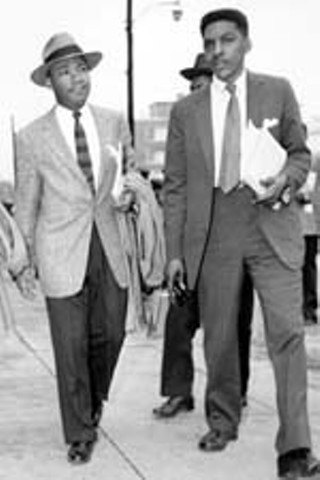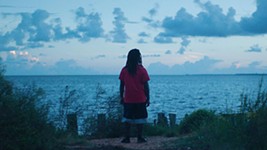Being Bayard Rustin
Bennett Singer and Nancy Kates' 'Brother Outsider' gets inside the life of a civil rights lion
By Anne S. Lewis, Fri., Nov. 14, 2003

Over the course of a 75-year life that ended in 1987, Bayard Rustin had been a member -- by choice or by circumstance -- of more disfavored societal groups than the average ego is capable of keeping afloat. He was black, gay (once arrested on a morals charge), once a member of the American Communist Party, once jailed as a World War II conscientious objector, and one of the architects of the civil rights movement. And while all of the foregoing, not surprisingly, landed him squarely within the FBI's sights -- and onto the pages of a voluminous surveillance file -- among his friends, his allies in civil rights circles, the Achilles' heel would turn out to be his gayness and past party affiliation.
Though Rustin rose to become an influential adviser to the much younger Martin Luther King, in the end he was deemed a political liability to the cause, his talents best utilized from behind the scenes, his upward mobility hobbled. Nonetheless, Rustin would be neither derailed nor embittered: He also happened to be a Quaker, and harnessed that religion's commitment to nonviolence to his commitment to achieving racial integration by organizing the first "freedom ride" through the South in 1947. Later, he become the chief organizer of the seminal 1963 March on Washington. At the time, it was the largest protest ever mounted.
In Brother Outsider: The Life of Bayard Rustin (2003), filmmakers Bennett Singer (who will be present at the Alamo screening) and Nancy Kates present a compelling biography of a remarkable man, a Renaissance man, really. (The film aired on PBS's P.O.V. last January and had award-winning screenings at film festivals from Sundance to Amnesty International.)
An illegitimate child, Rustin was raised middle-class in Pennsylvania by a charismatic Quaker grandmother who was a founding member of the NAACP. Digging through more than 200 sources of archival material, Singer and Kates discovered that in his early years, Rustin was a star athlete -- tennis, track, and football -- and a semiprofessional singer who appeared in a Broadway production with Paul Robeson in the Thirties. Though he attended several colleges, he never got a degree. It was at City College in New York that he saw the power of systematic organizing and radicalized, joining the Young Communist League. Later disillusioned with that group, he became more involved with A. J. Muste's Fellowship of Reconciliation and embraced the notion of nonviolent civil disobedience as a way to bring about social change.
Rustin was openly gay and had two long-term relationships with white men. His highly publicized 1953 arrest in California as "a suspected moral pervert" would reverberate until his death, chipping away at his legitimacy within the movement and providing fodder for his political enemies both within and without.
Austin Chronicle: Given Rustin's pervasive, Zelig-like presence in the civil rights movement, why is it that so few of us have ever heard of him?
Bennett Singer: That's the $64,000 question. I think it's overly simplistic to say that it's only because he was gay, though that certainly was a large part of it. Actually, he himself agreed to take a background role; following his arrest in '53, there was this sense that he would be most effective working behind the scenes, so as not to harm the cause. There were instances where he intentionally removed his name from documents that he co-authored in the Fifties, for fear that he would taint the public's reception of these publications. When he went to Montgomery, reports of his prior arrest surfaced, and he was forced to leave and consult with Martin Luther King from a distance. That occurred over and over again in his life. He would come into a situation and then be attacked or vilified and he would have to leave the place, or else was fired or demoted. But recently, there's been a wave of interest in him; he's being rediscovered with several biographies published and plays and this film.
AC: So how does one make a film about someone who made a conscious effort to stay behind the scenes and avoid publicity?
BS: That was my big concern: Was there enough archival material to tell the story? But it turned out that we were able to piece together the different elements: lots of still photographs, a fair amount of archival footage, some of which was frustratingly short, so we had very short clips that we were able to slow down. As one of the staff observed, he was like the Zelig of the civil rights movement -- there he was in India with Gandhi, there he is with LBJ or Stokely Carmichael or Malcolm X. We were able to find lots of photos. Walter Naegle, his partner for the last 10 years of his life, was a big help; he was a major supporter of the film and gave us access to his archival material.
I would also point out that Rustin was a gifted singer and had recorded two albums of spiritual and classical songs before he died, and we were able to use a lot of his singing in the film -- not only as background music but as a way of telling the story. There was an uncanny way that the lyrics of the songs he was singing tied into the historical events that we were portraying. There were songs called "Scandalize My Name," "Lonesome Valley," "Careless Love." So, there's this very rewarding sense of being able to let him tell his own story through the music, as well as through the narration that we put together.
There isn't a traditional narration in the film; the voiceover comes from Rustin's own writing. We struggled with that, but figured that having him tell his own story would make the most powerful story. So, we used his text from interviews he'd done and his letters and diaries. It's not always his voice in the voiceover, we had an actor do some of it. There are excerpts from the FBI surveillance file on Rustin. They monitored him for 30 years, even though he was not suspected of any specific crime. They tapped his phone following the March on Washington. At the end of his life, he asked for his FBI files under [Freedom of Information Act], and they sent him the many-thousand-page file. Walter Naegle shared it with us. The whole thing was kind of chilling. ![]()
Brother Outsider screens as part of the Texas Documentary Tour on Wednesday, Nov. 19, 7pm, at the Alamo Drafthouse Downtown (409 Colorado). Bennett Singer will conduct a Q&A after the screening. Tickets -- $4 for current Austin Film Society members and new members joining before the screening, as well as students; $6 for nonmembers -- are available through the Austin Film Society (322-0145) by phone or at the venue one hour prior to screening. For more information, check www.austinfilm.org.










